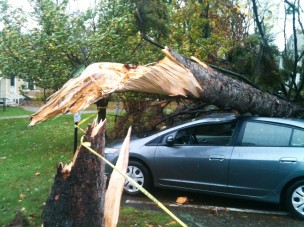
c/o Zach Schonfeld
Earlier this week, Hurricane Sandy struck the Northeast with severe winds and rain. Though ultimately the University was not seriously affected by the storm, groups such as Wesleyan’s Campus Community Emergency Response Team (C-CERT) and Physical Plant were active in preparing to ensure student safety. The administration also chose to cancel classes on Monday, Oct. 29, and Tuesday, Oct. 30, due to the storm.
According to Vice President of Student Affairs Michael Whaley, C-CERT met last Friday morning, Oct. 26, to discuss the arrival of the storm and how to deal with it. The participants in this meeting included representatives from Public Safety, Physical Plant, Usdan Dining Service, Residential Life, Information Technology Services, Academic Affairs, and the President’s Office. The representatives discussed the information that was already released about the storm, Middletown’s planned response, and the University’s preparedness.
Associate Vice President for Facilities Joyce Topshe wrote in an email to The Argus that many small projects were completed throughout the past year after the University saw the consequences of the snowstorm and blackout last year, which took place during late October 2011. Some of these projects included the purchase of 10 portable generators and the implementation of card access systems that would work during power outages. Immediate preparation for this storm required the entire Physical Plant staff to report to work on Monday and Tuesday even though classes were cancelled.
Though the storm caused severe damage throughout the Northeast, the University’s power remained throughout the duration of the hurricane, and there was minimal property damage.
“Wesleyan experienced only minor damage due to downed trees and branches,” Whaley said. “I understand that our Zipcars were damaged by a fallen tree.”
The majority of students were not affected, and they had conflicting opinions on how the University prepared for the storm.
“I think that, though the storm didn’t affect the University as badly as [anticipated], Wesleyan’s reluctance to cancel class was a decision that had the community’s anxiety levels on high,” said Jayleecia Smith ’16. “Perhaps we weren’t as prepared as we presumed, but I think the University made the right move in terms of keeping students safe and wary about their surroundings.”
However, Jordan Lem ’16 viewed the University’s reaction more positively.
“I think the Residential Advisors were all pretty well prepared,” Lem said. “[They knew what] they were gonna do in the event of the storm hitting hard.”
Parents also questioned some of the University’s actions during the preparation for Sandy.
“Some students and parents asked why we did not cancel classes earlier, especially in light of the extended power outage associated with last year’s October snowstorm,” Whaley said. “The University has made several improvements to our electrical infrastructure over the past year and has developed plans to restore power to the central part of the campus even if there is a prolonged power loss from the utilities. Thankfully, we did not have to activate that system.”
Ultimately, administrators and students alike agreed that preparation for this storm was stressful for all on campus.
“It was a busy night for the crew,” Topshe wrote. “But Wesleyan was prepared for the worst and fortunate to avoid the brunt of the storm.”
Comments are closed